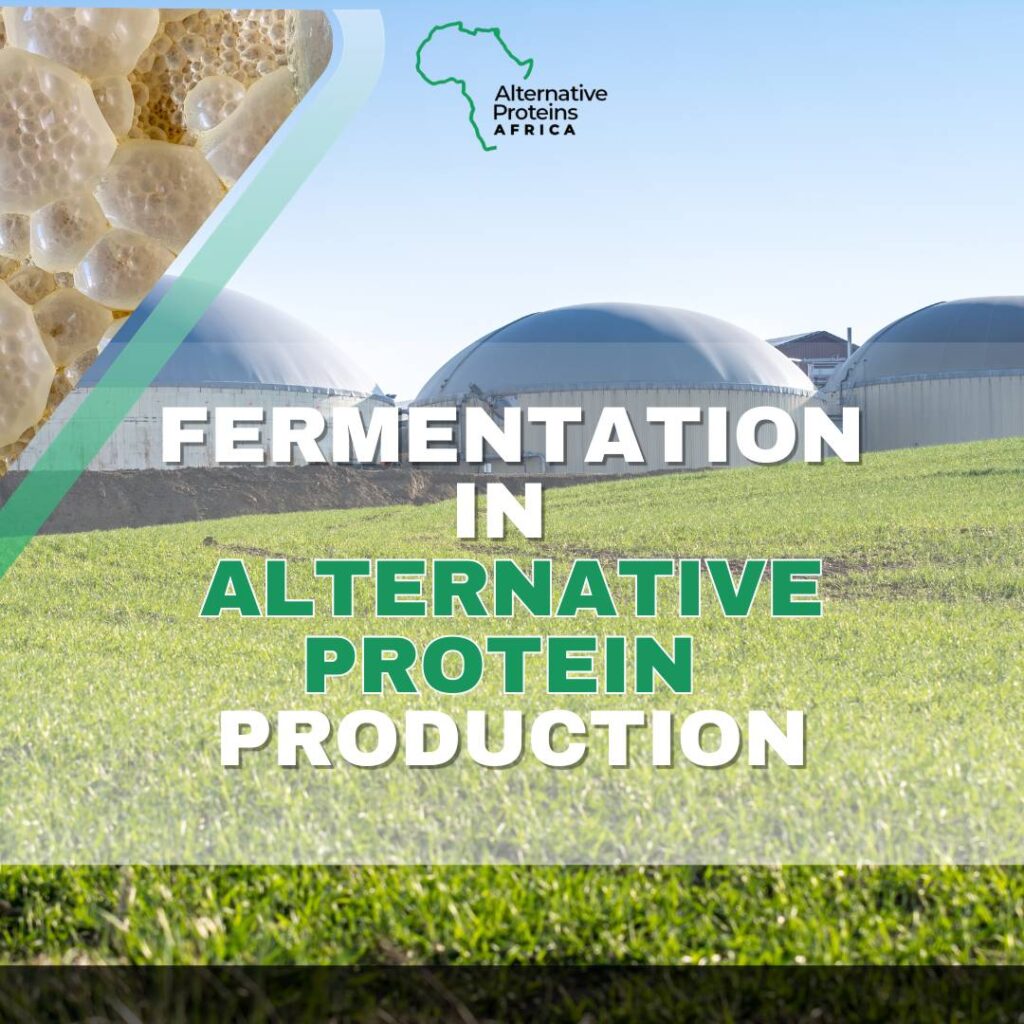
Fermentation emerges as a transformative tool in our quest for ethical, sustainable, and healthier protein sources. Though an older technique, fermentation has been helpful in the production of alternative proteins. Fortunately, the technique is now being adapted to better suit the present and future demands of the food system.
What is Fermentation?
Fermentation is an agelong, natural metabolic process using microorganisms, such as lactic acid bacteria, yeast, or molds, to convert carbohydrates into different compounds, including proteins. This process produces new foods with desired characteristics from initial food items or ingredients known as substrates.
Fermentation was originally used to preserve perishable agricultural products and produce beverages such as beer and wine. Fermented foods form a substantial part of the diet worldwide, making fermentation a vital tool in transforming the African food landscape. Fermented foods such as cereals-based foods (e.g., ogi, koko), tuber-based foods (e.g., fufu and garri), legumes-based condiments (e.g., Ugba, Iru), and fermented cereal-based beverages (e.g., Kunu) are widely prevalent within the continent.
However, fermentation has evolved beyond adding preservative characteristics to food. It is now used in food processing to achieve the desired qualities such as taste, nutrients, flavor, and aroma. Also, by creating plant-based protein-rich foods, it plays a significant role in producing alternative proteins.
What makes fermentation an essential technique in sustainable food production?
The sustainability of fermentation as a food production technique primarily depends on the source of the products used as substrate. Even though fermentation is an agelong food processing technique, it is necessary to emphasize the need for its application in non-animal-based protein production. In sustainable food processing, fermentation is applied to plant-sourced foods or ingredients, thus addressing the problem of animal agriculture.
Additionally, the preservative characteristics of fermentation contribute to it being a sustainable food processing method. It increases food’s shelf life, reduces food waste, and guarantees food availability, especially in remote African countries.
Types of fermentation
There are three forms of fermentation used in the production of alternative proteins. These are:
Traditional fermentation: Remember wine, bread, beer, and yogurt? These food items are produced using this indigenous and spontaneous fermentation type, which involves naturally present live microorganisms. In alternative protein production, traditional fermentation helps achieve desired features and functional properties in food items using plant-based substrates.
Biomass fermentation: In biomass fermentation, microorganisms, such as fungi and algae with high protein content, are grown on organic materials. This process aims to ensure the production of protein-rich foods by mass-producing these microorganisms. Consequently, these organisms are major ingredients in producing alternative proteins such as animal-free meat alternatives. Biomass fermentation, however, requires in-depth process optimization to achieve purity and high yields.
Precision fermentation: It is a more sophisticated type of fermentation. Here, the microorganisms are modified into production ‘rooms’ to make desired end products, such as specific enzymes, proteins, fats, etc. An example is the production of a particular type of rennet (an enzyme) used in making cheese.
As the name implies, the production process involved in precision fermentation, from the programming of the microorganisms to the fermentation itself, is controlled with precision and consistency. Precision fermentation is important in making plant-based meat and dairy alternatives and cultured proteins.
What are the nutritional benefits of fermentation?
1. Improves food digestibility: Fermentation enhances food digestion. It helps break down some complex proteins and carbohydrates into more digestible forms. This is especially important to those with specific digestion-associated difficulties.
2. Improves availability and retention of nutrients: Fermentation releases bioactive compounds such as minerals and vitamins. It also removes some anti-nutrients present in foods like legumes. All these ease access to nutrients.
3. Fermented foods are good sources of probiotic microorganisms: These beneficial microorganisms confer health benefits such as improving the health of the digestive system and reducing the risk of diabetes and cardiovascular diseases. These probiotics are an excellent nutritional complement. The distribution of prebiotics, however, varies with the type of food and a host of other factors.
4. Fermented foods also boost immunity: Studies have shown that fermented foods increase immune function, thereby reducing the risk of infection.
Significance of fermentation in alternative proteins production
Fermentation offers the alternative protein industry several benefits. The technique, aside from providing protein-enriched foods, holds promise in improving the quality of other classes of alternative proteins (plant-based proteins and cultured proteins). For instance, a recent study in the ACS’ Journal of Agricultural and Food Chemistry reveals that fermented onions could make plant-based meat more ‘meaty.’ This finding is a breakthrough, knowing fully well that replicating similar taste as animal-source meat is a significant challenge of plant-based meat. This, in return, will replace the use of synthetic additives that are currently being used to achieve this taste.
Challenges and future trends in Africa
As a result of the reported health benefits, interest in fermented food has recently been ignited, and this interest presents opportunities for growth within the fermentation industry.
It’s worth noting that traditional fermentation is the most prevalent in a typical African community. The less technicality required in traditional fermentation contributes to this. Therefore, as a familiar innovation to the African community, food safety concerns of traditionally fermented foods should be addressed. These concerns can be addressed by introducing better quality control and hygiene practices and promoting information on healthy fermentation practices.
Furthermore, growth within the fermentation industry in the continent, especially in biomass and precision fermentation processes, relies on investments in research and development and human capacity development. This is crucial to the future of fermentation in Africa.
Conclusion
Fermentation is a significant food processing technique in the call for ethical, sustainable, and healthier protein sourcing. Fermentation-enabled alternative proteins benefit humans, animals, and the environment. It is, therefore, important that fermentation processes are optimized for improved yield and efficiency.

